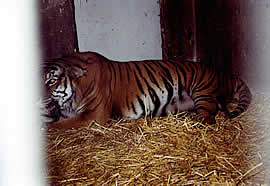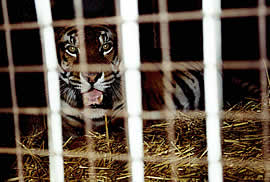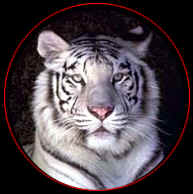Information on wild animals in circuses.

Go to www.vgt.at/actionalert/circus/commissioner/index.php?country=uk
EU ATTACKS AUSTRIAN ANIMAL WELFARE LEGISLATION
Information on wild animals in circuses

Ask the British EU Commissioner to vote in favour of the ban on wild animals in circuses!
Ultimately all EU Commissioners have to agree on whether Austria will be taken to the European Court. This includes the British EU Commissioner Peter Mandelson. Appeal to Mr Mandelson that he should ask for the support of other EU Commissioners in upholding the ban on wild animals in circuses and that he himself should vote against taking this complaint to the European Court.
Complete our online form to send an email to Mr Mandelson:
To: Peter Mandelson
peter.mandelson@cec.eu.int
European Commissioner for Trade
Subject: Please vote for the ban on wild animals in circuses in Austria

Dear Commissioner Mandelson,
Your colleague Commissioner Mr. McCreevy, in a letter to the Austrian Foreign Office, from 12th October, Ref : 2005/4510 K(2005)4020, made the complaint that the ban on wild animals in circuses, which is in accordance with the Austrian animal protection law, illegally restricts the work of circuses.
He argues that while animal protection is in general important, it is unnecessary to make a complete ban on wild animals in circuses in order to meet that end.
Expert opinion on wild animals in circuses
In 1996 the Viennese Environmental Advocacy published a scientific paper on the keeping of wild animals in circuses. The conclusion of this work is clear:
"The general aim for the future is to only allow animal species to be kept in circuses when it is clear that the requirements of that species can be adequately met. We would like to explicitly point out that with regards to wild animals, it is in principle not possible to comply with these requirements."
The umbrella organisation for all EU animal protection groups, Eurogroup for Animal Welfare, is also of the same opinion. They stated 2nd August:
"It is the opinion of the Eurogroup that the keeping of wild animals in circuses can neither be justified on ethical nor conservational grounds and should therefore be phased out with the aim of having a ban on the keeping of wild animals in circuses."
The ban on wild animals in circuses §27 of the animal protection law must be viewed as a progressive Step towards the developing ideals of animal protection. In the near future other EU member states will be implementing such legislation.
Special problems in the keeping of wild animals in circuses
The fact that §25 (keeping of wild animals) and in particular §28 (use of animals at public events) of the Austrian animal protection law generally neither forbid the keeping of wild animals in Austria nor the use of them at public events is not a contradiction. The problem lies in the fact that the circuses can not meet the requirements of the animals due to being so regularly in transit, whereas other keepers may well be able to provide adequate enclosures. In addition, wild animals used in individual events (for example during the making of films) may suffer as an exception some short term stress, otherwise permission would not be granted if the stress was longer term. In the circus wild animals are, in contrast, under constant stress due to on going performances and living in enclosures that are unavoidably too small.
Keeping wild animals in circuses means that humans must come into direct contact with them. Wild animals pose a danger to humans and to this end the animals are accordingly trained. This training necessitates breaking the animal's will through violence. The animal must regard the keeper as superior and inviolable. This is in contrast to the situation in zoos and wildlife reserves where direct contact between humans and wild animals is not necessary, this is known as protected contact or offhand management. With this method of keeping wild animals the animals will need never be broken as the keepers only ever have contact to the animals with the protection bars, mesh or similar restrictions.
Danger to people
An additional aspect is the danger that wild animals in circuses pose to people. When large, strong and potentially dangerous animals in circuses come into contact with people it can result in severe accidents (see
www.circuses.com/attacks.asp).
Between 1998 und 2002 there were alone in Austria four cases of wild circus animals injuring people; a young boy was trampled on by a camel, a young monkey bit someone on two occasions and in July 1998 an elephant from the Circus Belly Vienna lifted a spectator over the barrier and crushed his chest. The man was life threateningly injured and had to be rushed to hospital and put into an induced-coma.
Impossibility of effective control measures
Making sure that animal welfare laws are being upheld in a particular circus is almost impossible. There simply is not the time to pin point problem areas and follow up whether they have been remedied or not when the circus is always on the move. A case in point is the German circus, Circus Barelli. This circus was holding performances in Vienna, Austria during April 2003. At this time the Viennese animal protection law had relatively strict regulations concerning the keeping of five tigers belonging to the circus as part of the phasing out plan of having wild animals in circuses at all. As a consequence of these regulations the circus was obliged to borrow meshing in order to build on outdoor enclosure of the required size. This enclosure remained without any structure throughout the duration of their stay. Moreover, the Verein Gegen Tierfabriken (Association against Animal Factories) was able to prove through continuous observation that the day after the inspecting veterinary officer had left, the five tigers were put into a transport wagon and remained there at least during that whole day. The outdoor enclosure stayed empty.
Conclusion
The only possible way to ensure the well-being of all wild animals is to out-law without exception the keeping of wild animals in circuses. This measure imposes a justifiable restriction on the way in which a circus may conduct its business. I therefore ask you to seek the support of your colleagues and to view the Austrian law forbidding the keeping of wild animals in circuses as a model and not to jeopardize it through allowing this complaint to be taken further.
The European Member of Parliament Mr Jörg Leichtfried, demanded in a statement on 15. November 2005
The welfare of animals should and must become a European value of absolute priority!
I agree in full with his demand.
Yours sincerely,
Title:
First name:
Surname:
Email:
------------------------------------------------------------------------

photo www.tigerfreund.de



